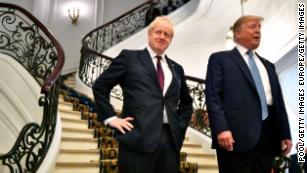A 'rude shock' for markets: Asian stocks slide on US-China trade tit-for-tat
Asian markets were battered Monday amid a confusing swirl of signals about the US-China trade war.
Hong Kong's Hang Seng Index (HSI) tanked nearly 3%, while China's Shanghai Composite Index(SHCOMP) fell 1.2%. Japan's Nikkei 225 (N225) tumbled 2.2%, and South Korea's Kospi (KOSPI)declined 1.7%.
Monday's selloff reflects how worried investors are about tariff hikes from both the United States and China, and whether the latest chapter in the dispute could fuel a severe global economic slowdown.
US futures also slid. Dow (INDU) futures were down nearly 200 points, or 0.7%, during Asian hours. The S&P 500 (SPX) and the Nasdaq (COMP) fell 0.8% and 0.9%, respectively.
"Risks to the global economy and markets have increased" following the latest escalations, wrote Mark Haefele, global chief investment officer of UBS Wealth Management, in an overnight research note.
More tariff troubles renew trade worries
Earlier this month, US President Donald Trump announced in a tweet a new 10% tariff on an additional $300 billion in Chinese goods to be imposed September 1, though the import tax on some of those goods was later delayed. China hit back Friday, with a round of retaliatory tariffson US goods worth $75 billion, also set to start on September 1.
After markets closed in the United States on Friday, Trump said he would raise tariffs on $250 billion in Chinese exports to 30% from 25% in October, and that the tariffs kicking in next week will now be 15%, rather than 10%.
Trump also tweeted that he "hereby ordered" US companies that do business in China to "immediately start looking for an alternative." The Dow closed down more than 600 points on Friday.
After Trump appears to soften on trade war, White House says he wanted higher tariffs
Chinese state-run media added another layer to the tensions this weekend. The country "is capable of fighting until the end if some people in the United States insist on playing a zero-sum game," read an opinion piece published Saturday in People's Daily, the ruling Communist Party's official newspaper.
"The latest increased tariffs had no doubt been a rude shock for the markets and tells of the unpredictability of this ongoing trade war," wrote Jingyi Pan, a market strategist for IG Group, in a research note Monday.
The trade war escalation came just ahead of the meeting of G7 leaders in Biarritz, France, this weekend.
On Sunday, Trump briefly appeared to express doubts about his approach to the dispute. When reporters asked about the tariffs he told them, "I have second thoughts about everything," without specifying what exactly he might be rethinking.
The White House later said Trump misheard the question.
"Actually what he was intending to say is he always has second thoughts and actually had second thoughts about possibly a higher tariff response to China," Trump's chief economic adviser Larry Kudlow said Sunday on CNN's "State of the Union."
"It was not to remove the tariff," he said.
More declines elsewhere
Oil markets also remained in a "trade war funk," as one analyst put it. US oil futures fell 1.4% while futures for Brent crude, the global benchmark, fell 1.1%.
"Given that thawing in US-China tensions is all but a pipe dream at this stage ... the path of least resistance for oil markets does appear lower," wrote Stephen Innes, managing partner at Valour Markets, in a research note.
The Chinese yuan also skidded Monday against the US dollar. The currency was trading at about 7.14 yuan per dollar in mainland China — down more than 0.6% compared to the previous session. In offshore trading, where it trades more freely, a dollar can buy around 7.16 yuan, a 0.4% decline.
News Courtesy: www.cnn.com












